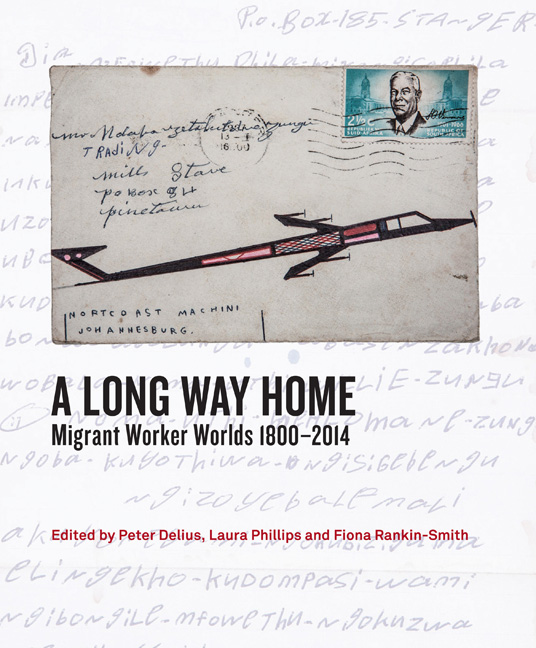Book contents
- Frontmatter
- Contents
- Acknowledgements
- Introduction: Highlighting Migrant Humanity
- Chapter 1 Ngezinyawo - Migrant Journeys
- Chapter 2 Slavery, Indenture and Migrant Labour: Maritime Immigration from Mozambique to the Cape, c.1780–1880
- Chapter 3 Walking 2 000 Kilometres to Work and Back: The Wandering Bassuto by Carl Richter
- Chapter 4 A Century of Migrancy from Mpondoland
- Chapter 5 The Migrant Kings of Zululand
- Chapter 6 The Art of Those Left Behind: Women, Beadwork and Bodies
- Chapter 7 The Illusion of Safety: Migrant Labour and Occupational Disease on South Africa's Gold Mines
- Chapter 8 ‘The Chinese Experiment’: Images from the Expansion of South Africas ‘Labour Empire’
- Chapter 9 ‘Stray Boys’: The Kruger National Park and Migrant Labour
- Chapter 10 Surviving Drought: Migrancy and the Homestead Economy
- Chapter 11 Migrants from Zebediela and Shifting Identities on the Rand, 1930s–1970s
- Chapter 12 Verwoerd's Oxen: Performing Labour Migrancy in Southern Africa
- Chapter 13 ‘Give My Regards to Everyone at Home Including Those I No Longer Remember’: The Journey of Tito Zungu's Envelopes
- Chapter 14 Sophie and the City: Womanhood, Labour and Migrancy
- Chapter 15 Bungityala
- Chapter 16 Migrants: Vanguard of the Worker's Struggles?
- Chapter 17 Debt or Savings? Of Migrants, Mines and Money
- Chapter 18 Post-Apartheid Migrancy and the Life of a Pondo Mineworker
- Notes on Contributors
- List of Figures and Tables
- Index
Introduction: Highlighting Migrant Humanity
Published online by Cambridge University Press: 04 July 2018
- Frontmatter
- Contents
- Acknowledgements
- Introduction: Highlighting Migrant Humanity
- Chapter 1 Ngezinyawo - Migrant Journeys
- Chapter 2 Slavery, Indenture and Migrant Labour: Maritime Immigration from Mozambique to the Cape, c.1780–1880
- Chapter 3 Walking 2 000 Kilometres to Work and Back: The Wandering Bassuto by Carl Richter
- Chapter 4 A Century of Migrancy from Mpondoland
- Chapter 5 The Migrant Kings of Zululand
- Chapter 6 The Art of Those Left Behind: Women, Beadwork and Bodies
- Chapter 7 The Illusion of Safety: Migrant Labour and Occupational Disease on South Africa's Gold Mines
- Chapter 8 ‘The Chinese Experiment’: Images from the Expansion of South Africas ‘Labour Empire’
- Chapter 9 ‘Stray Boys’: The Kruger National Park and Migrant Labour
- Chapter 10 Surviving Drought: Migrancy and the Homestead Economy
- Chapter 11 Migrants from Zebediela and Shifting Identities on the Rand, 1930s–1970s
- Chapter 12 Verwoerd's Oxen: Performing Labour Migrancy in Southern Africa
- Chapter 13 ‘Give My Regards to Everyone at Home Including Those I No Longer Remember’: The Journey of Tito Zungu's Envelopes
- Chapter 14 Sophie and the City: Womanhood, Labour and Migrancy
- Chapter 15 Bungityala
- Chapter 16 Migrants: Vanguard of the Worker's Struggles?
- Chapter 17 Debt or Savings? Of Migrants, Mines and Money
- Chapter 18 Post-Apartheid Migrancy and the Life of a Pondo Mineworker
- Notes on Contributors
- List of Figures and Tables
- Index
Summary
In the twentieth century, South Africa became internationally infamous for a pervasive system of racial discrimination. Less widely acknowledged is how fundamental migrant labour was to the making of modern South African society. Nowhere else in the world have urbanisation and industrialisation been as comprehensively based on migrant labour as in South Africa. Migrancy and institutionalised racism fed off each other and shaped the lives and deaths of millions of people. And, as the tragic events at Marikana have underscored, it is a system that haunts South Africa's present as well as its past.
The main aim of this book is to portray migrant experience, agency and humanity in thought, action and expression – dimensions that are often neglected in overviews of the migrant labour system. It can be read on its own, but it was conceived during the planning of an art exhibition on migrant life entitled ‘Ngezinyawo — Migrant Journeys’, which opened at the Wits Arts Museum in April 2014. It is our hope that this book, together with the images, artefacts and soundtracks in the exhibition, will provide an enriched perspective on the history of migrant labour.
Migrants have often been presented as victims tossed to and fro on currents entirely out of their control. In this view, they have no agency and certainly no part in shaping the development and the form of the system. While there is no doubting the asymmetries of power in the making of an economy based on migrant labour, there is a considerable body of research from recent decades that has qualified this account, showing how migrant struggles and choices helped to shape the system. What has also emerged much more clearly is how migrants found ways to assert and express their humanity. They crafted rich forms of art, dress, dance, music and song. They created a myriad of social forms – from burial societies to mine marriages – to sustain them in desolate and often dangerous environments. They conjured forms of masculinity that enabled them to conceive of their lives as the heroic struggles of warriors in a peculiar form of purgatory. As the twentieth century progressed and growing numbers of women travelled to town, their presence created new economic and social practices and added vivid strands to the tapestry of city life.
- Type
- Chapter
- Information
- A Long Way HomeMigrant Worker Worlds 1800–2014, pp. 1 - 16Publisher: Wits University PressPrint publication year: 2014



